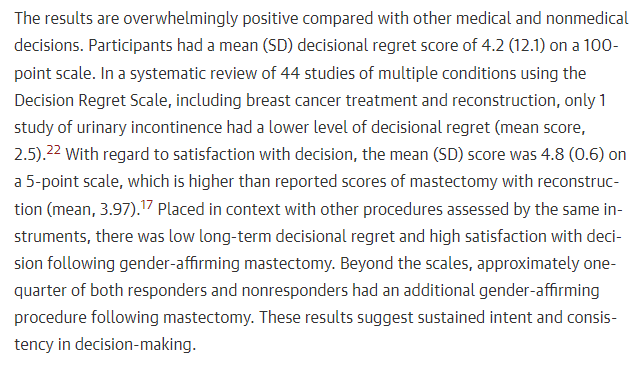Conservatives Don’t Want You to Know: Trans Regret is Unusually Rare
Anti-trans actors large and small have rushed to find excuses for why a study showing trans people are less likely to regret surgery than almost any other procedure can’t possibly be taken seriously.
by Evan Urquhart
In 2021 a systematic review and meta-analysis of surgical regret among transgender people found only 1 percent of trans patients who have surgery as part of a medical transition experienced regret after the fact. So it should come as no surprise to anyone that a new study in the Journal of the American Medical Association found high rates of satisfaction and low rates of regret among 139 trans patients who received double mastectomies through a particular center between 1990 and 2020. In addition to providing longer-term follow up data, which few previous studies had done, the JAMA paper used scales of patient satisfaction and regret that had previously been used for many other procedures, allowing the authors to compare trans patients’ feelings after mastectomy to the responses patients have had to other procedures. Unsurprisingly in light of previous findings on transgender people and surgical regret, the study found trans patients had less regret than almost any other procedure.
All in all, this looks like a solid paper that found similar results to other studies and contributes to an overall understanding that trans people rarely experience regret after accessing surgery as part of their transition. It shouldn’t come as a surprise to anyone, but certain people who have staked their careers on opposing the medical evidence on gender-affirming care do not seem to have taken it well. Jesse Singal complained that the response rate of 59 percent was low and the study only looked at transgender adults. Leor Sapir and Matt Walsh later expressed the exact same complaints, and their tweets were written up in a Fox News story casting doubt on the study’s results.
The criticisms are, of course, completely true as far as they go. This is one small study of 139 patients at one medical center. While the response rate of 59 percent is not unusually low for a longitudinal study of this type, it’s perfectly valid not to take a single small study with a so-so response as the definitive answer to how common surgical regret among trans people is. Any individual study could be an outlier, and all studies have flaws. That’s why it’s so important to look at the overall research picture on a question and not get attached to any one result.
The overall research picture on the question of surgical regret among trans patients is that regret is unusually low. Many of the studies have had fairly low sample sizes, or a medium-poor response rate… but there’s never been a study that found surgical regret was high.
Assigned’s reading of Leor Sapir, Matt Walsh, Jesse Singal, and Fox News views is that they’re suggesting there are huge numbers of trans people who regret their surgeries, but are impossible to find. They also suggest that if the young people who have accessed similar surgeries were studied they’d show a different result, despite there being even higher guardrails and lengthier assessments for the very few minors whose parents and doctors agreed such surgeries were medically necessary for them. They suggest this without evidence. If they believe it, it is a matter of faith.*
The double standard impacting transgender medical care is that no study can ever be good enough, no finding positive enough, for critics to agree to treat transition like any other type of treatment and just follow the evidence where it leads. Instead of accepting the results we have and being willing to change course if some new piece of evidence calls these results into question they want to greatly reduce access based on speculation, innuendo, and games of just-suppose. Proponents of the medical evidence are proponents of gender-affirming care. Not because they’re ideologically committed to it, but because as a matter of medicine you don’t limit access to a treatment that has such overwhelmingly positive results.
CORRECTON: The first verson of this paragraph stated that Sapir, Walsh, Singal, and Fox “believe” that there are huge numbers of trans people who regret their surgeries, but are impossible to find. On Twitter, Singal asked for a correction or proof that he has stated that he holds such a belief. On reflection, we acknowledge that we’re not privy to the internal mental states of Singal, much less Fox News, making the word “belief” in this context imprecise. We’ve updated the paragraph to reflect that this is what is being suggested, not a belief these people and corporate entity necessarily hold.
Singal replied to an offer to print any additional comment he might have with this post:




